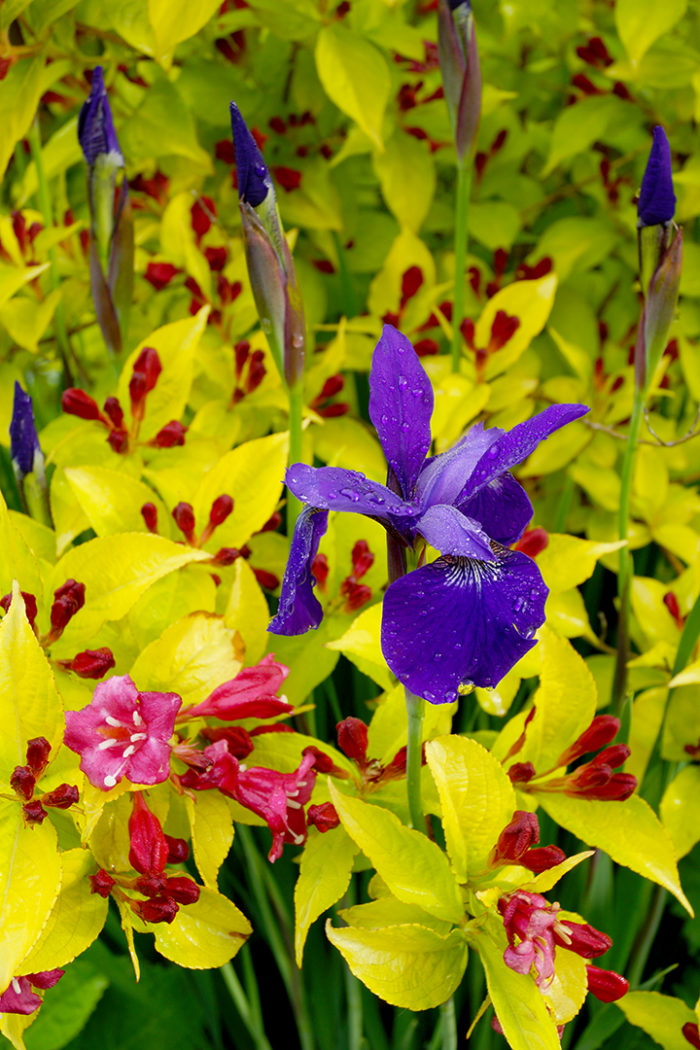
Late May to early June—after spring’s chill is past but before summer’s heat and humidity have set in–is naturally a time of lush foliage and abundant bloom in our Mid-Atlantic gardens. Everything looks so good that putting effort into planning combinations seems almost like “gilding the lily,” as the saying goes. But hey, if you have the opportunity to make something good even better, why not go for it?
High-impact: Chartreuse and purple-blue
Combining sunny yellow foliage with rich blues and purples is a bold way to mark the transition from spring to summer, and there are so many options that it never gets boring. Start with a chartreuse-leaved shrub, such as golden bridal wreath spirea (Spiraea thunbergii ‘Ogon’, Zones 4–8) or Golden Spirit smoke bush (Cotinus coggygria ‘Ancot’, Zones 4–8), as a backdrop. Then set a beautiful blue or purple in front of it, perhaps May Night perennial sage (Salvia × sylvestris ‘Mainacht’, Zones 4–8) or ‘Blue Ice’ amsonia (Amsonia ‘Blue Ice’, Zones 4–9). The combo above, of Briant Rubidor weigela (Weigela florida ‘Olympiade’, Zones 4–8) with ‘Caesar’s Brother’ Siberian iris (Iris sibirica ‘Caesar’s Brother’, Zones 3–8) is a great example of a bold gold-and-purple pairing with an added bonus: the weigela’s eye-popping pinkish red flowers, which open around the same time as the iris.
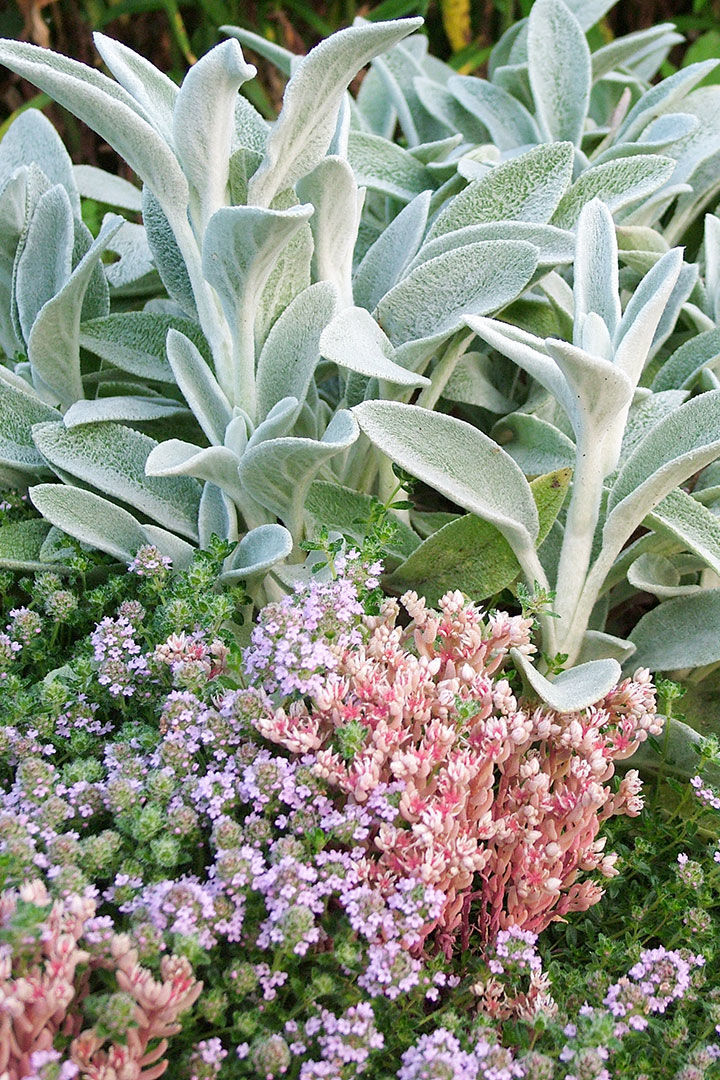
On the softer side: Silver with pink
Prefer your combinations on the softer side? There are plenty of pastels around now too, and they pair perfectly with silvery foliage. This sunny-slope partnership features ordinary lamb’s ears (Stachys byzantina, Zones 4–8) matched with two ground-hugging companions: creeping thyme (Thymus praecox ‘Coccineus’, Zones 4–9) and Spanish stonecrop (Sedum hispanicum, Zones 5–10). In late spring, you get silver surrounded by shades of pink from the thyme and sedum blooms for a delicate display; for the rest of the growing season, there’s a terrific textural contrast of the bold and dainty leaves. I like to use the regular lamb’s ears because its foliage is more in scale with the tiny thyme and sedum, but it does require deadheading if seedlings are not wanted. You might choose to use larger-leaved ‘Big Ears’ (Stachys byzantina ‘Big Ears’, syn. ‘Helene von Stein’, Zones 4–9) instead, because it is much less likely to flower and therefore needs less maintenance.
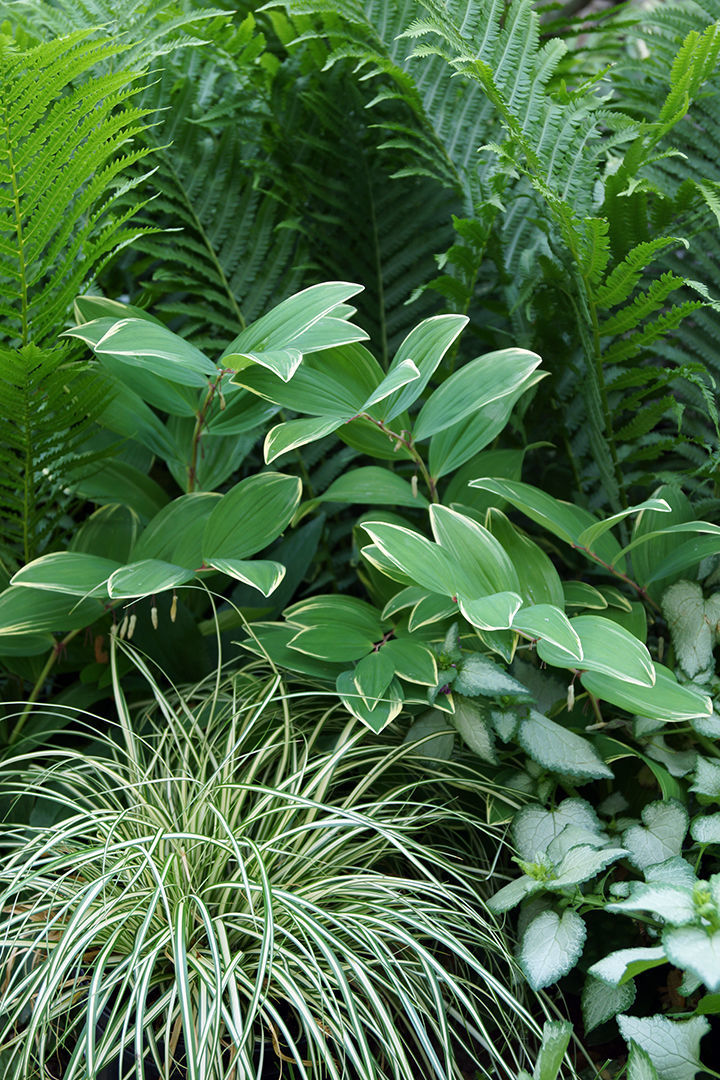
Keeping it cool: Green with white and silver
Late spring generally marks the end of the end of the most spectacular season in shady gardens, but these areas can still make an impact once summer comes, particularly if you create combinations that look good now and through the rest of the season as well. That means foliage should be a key feature, contributing interesting colors or contrasting textures—or both, ideally! This grouping focuses on cool greens, white, and silver from dependable shade-garden favorites: white-marked variegated Solomon’s seal (Polygonatum odoratum var. pluriflorum ‘Variegatum’, Zones 3–8), bright green ostrich fern (Matteuccia struthiopteris, Zones 3–7), silvery ‘White Nancy’ spotted dead nettle (Lamium maculatum ‘White Nancy’, Zones 3–8), and white-striped Japanese grass sedge (Carex morrowii ‘Variegata’, Zones 5–9). With the elegant interplay of the different leaf shapes and patterns, the late-spring addition of white flowers from the Solomon’s seal and spotted dead nettle is a lovely bonus feature.
All of these plants are well-suited to the Mid-Atlantic region, so feel free to use these time-tested combos as presented or as inspiration for your own late-spring groupings.
Nancy J. Ondra is the author of over fifteen books, including Grasses, The Perennial Care Manual, and The Perennial Matchmaker.
Fine Gardening Recommended Products

Planting in a Post-Wild World: Designing Plant Communities for Resilient Landscapes
Fine Gardening receives a commission for items purchased through links on this site, including Amazon Associates and other affiliate advertising programs.

ARS Telescoping Long Reach Pruner
Fine Gardening receives a commission for items purchased through links on this site, including Amazon Associates and other affiliate advertising programs.
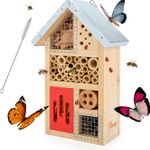
Niteangel Natural Wooden Insect Hotel, Garden Insect House for Ladybugs, lacewings, Butterfly, Bee, Bug
Fine Gardening receives a commission for items purchased through links on this site, including Amazon Associates and other affiliate advertising programs.







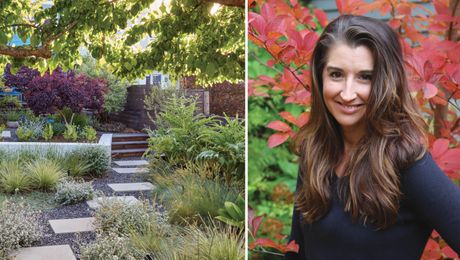
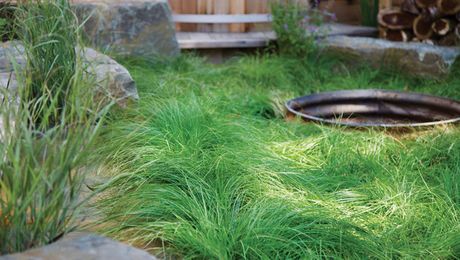










Comments
Log in or create an account to post a comment.
Sign up Log in